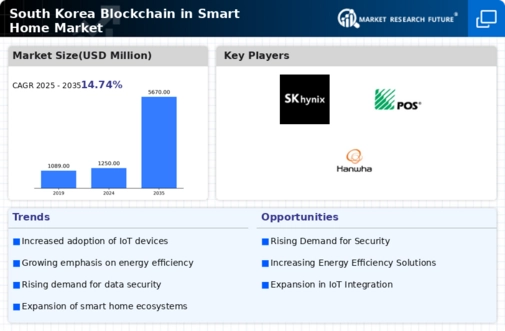Rising Cybersecurity Concerns
Rising cybersecurity concerns among consumers in South Korea are driving the blockchain in-smart-home market. With the proliferation of connected devices, the risk of cyber threats has escalated, prompting consumers to seek more secure solutions for their smart homes. Blockchain technology, known for its robust security features, offers a promising solution to these concerns. By enabling secure device communication and data storage, blockchain can mitigate risks associated with unauthorized access and data breaches. Recent surveys indicate that over 70% of South Korean consumers express apprehension regarding the security of their smart home devices. This growing awareness is likely to propel the demand for blockchain-enabled smart home solutions, as consumers prioritize security in their purchasing decisions. Consequently, the blockchain in-smart-home market is expected to witness accelerated growth as it addresses these pressing cybersecurity challenges..
Growing Demand for Smart Home Automation
The increasing demand for smart home automation in South Korea is a pivotal driver for the blockchain in-smart-home market. As consumers seek enhanced convenience and control over their living environments, the integration of blockchain technology offers a secure and efficient means to manage smart devices. According to recent data, the smart home market in South Korea is projected to reach approximately $10 billion by 2026, indicating a robust growth trajectory. This demand is fueled by a rising awareness of energy efficiency and the desire for improved home security. Blockchain's ability to provide transparent and tamper-proof records of device interactions further enhances consumer trust, making it a compelling choice for smart home solutions. Consequently, the blockchain in-smart-home market is likely to experience significant expansion as more households adopt these technologies.
Consumer Awareness and Education Initiatives
Consumer awareness and education initiatives are vital drivers for the blockchain in-smart-home market in South Korea. As the market evolves, it becomes essential for consumers to understand the benefits and functionalities of blockchain technology in smart homes. Educational campaigns and outreach programs can demystify blockchain, highlighting its advantages such as enhanced security, interoperability, and energy efficiency. Recent studies indicate that informed consumers are more likely to adopt blockchain-enabled smart home solutions, with a potential increase in market penetration by up to 25% over the next few years. By fostering a better understanding of blockchain's role in smart homes, these initiatives can stimulate demand and drive growth in the blockchain in-smart-home market. As awareness increases, consumers may become more inclined to invest in smart home technologies that incorporate blockchain, further propelling market expansion.
Regulatory Support for Blockchain Innovations
Regulatory support for blockchain innovations in South Korea serves as a crucial driver for the blockchain in-smart-home market. The South Korean government has been actively promoting the adoption of blockchain technology across various sectors, including smart homes. Initiatives aimed at fostering a favorable regulatory environment are likely to encourage investment and innovation in this space. For instance, the government has allocated substantial funding to support research and development in blockchain applications, which could lead to enhanced functionalities in smart home systems. This supportive framework may facilitate the integration of blockchain solutions, thereby increasing their adoption among consumers. As a result, the blockchain in-smart-home market is expected to benefit from this proactive regulatory stance, potentially leading to a more vibrant ecosystem for smart home technologies.
Integration of IoT and Blockchain Technologies
the integration of Internet of Things (IoT) and blockchain technologies is a significant driver for the blockchain in-smart-home market.. In South Korea, the convergence of these technologies enables seamless communication between smart devices while ensuring data integrity and security. As IoT devices proliferate, the need for a decentralized and secure framework becomes increasingly apparent. Blockchain can facilitate secure transactions and interactions among devices, enhancing the overall functionality of smart home systems. Market analysts project that the IoT market in South Korea will reach approximately $30 billion by 2025, underscoring the potential for blockchain to play a vital role in this ecosystem. This integration is likely to foster innovation and create new opportunities within the blockchain in-smart-home market, as developers seek to leverage the strengths of both technologies.














Leave a Comment